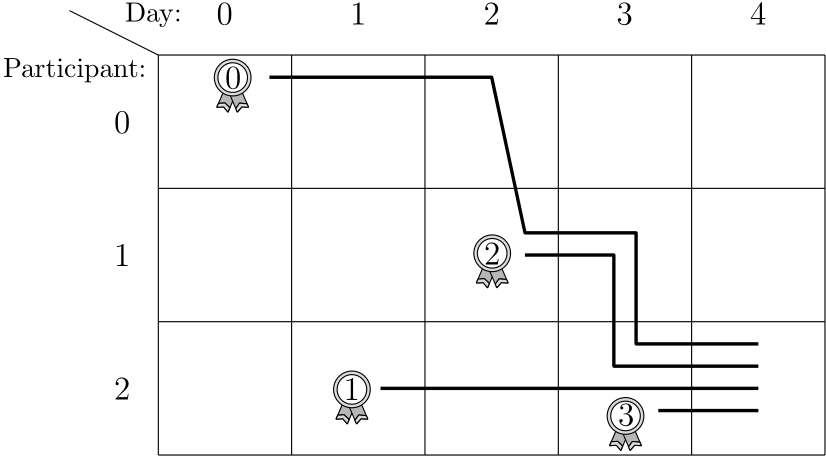There are participants numbered to competing in a padel tournament held over days. Exactly one match is held each day. There are medals handed out in the tournament, a new one for each match. In the match on day , the two participants numbered and are participating. The following happens in the match:
- Participant beats participant .
- A new medal is given to the winner .
- All of the loser's current medals are given to the winner.
On day (the day after the last match) the prize ceremony is held. At the ceremony, all medals are collected and then each medal is given to the participant that held that medal the longest. Formally, medal is given to the participant who held medal for the most nights (not necessarily in a row), as of day . If two or more participants have held a medal for the same number of nights, the medal is given to the participant with the smallest index among them.
Your goal is to determine how many medals each participant is awarded at the prize ceremony.
Input
The first line of input contains the integers and , the number of participants and number of
matches.
Then lines follow. The th of these lines contains two integers and , the participants competing on day , where participant beats participant .
Output
On the single line of output print integers, the th number representing the number of medals that participant has after the prize ceremony.
Constraints and Scoring
- and for all .
Your solution will be tested on a set of test groups, each worth a number of points. Each test group contains a set of test cases. To get the points for a test group you need to solve all test cases in the test group.
| # | Score | Limits |
|---|---|---|
| 1 | 12 | |
| 2 | 16 | |
| 3 | 15 | The winner of the th match participates in the th match, for every such that |
| 4 | 20 | At the time of the th match, has at least as many medals as , for every such that . |
| 5 | 22 | Once a participant loses, they are never in a match again. |
| 6 | 15 | No additional constraints. |
Example 1
stdin
3 4
0 1
2 1
1 0
2 1
stdout
1 1 2
Explanation
For the first sample test case, the following illustration shows who held which medals throughout the tournament. When participant loses on the rd day, all her medals are given to participant .

Example 2
stdin
3 7
0 1
0 2
2 0
0 1
1 0
2 0
0 2
stdout
2 2 3
Explanation
The second sample can be seen below.

After the prize ceremony, participant is given medals and , participant is given medals and , and participant is given medals and .
Example 3
stdin
6 10
2 5
3 0
4 2
0 1
4 3
2 4
0 3
0 2
5 2
5 0
stdout
5 0 1 1 1 2